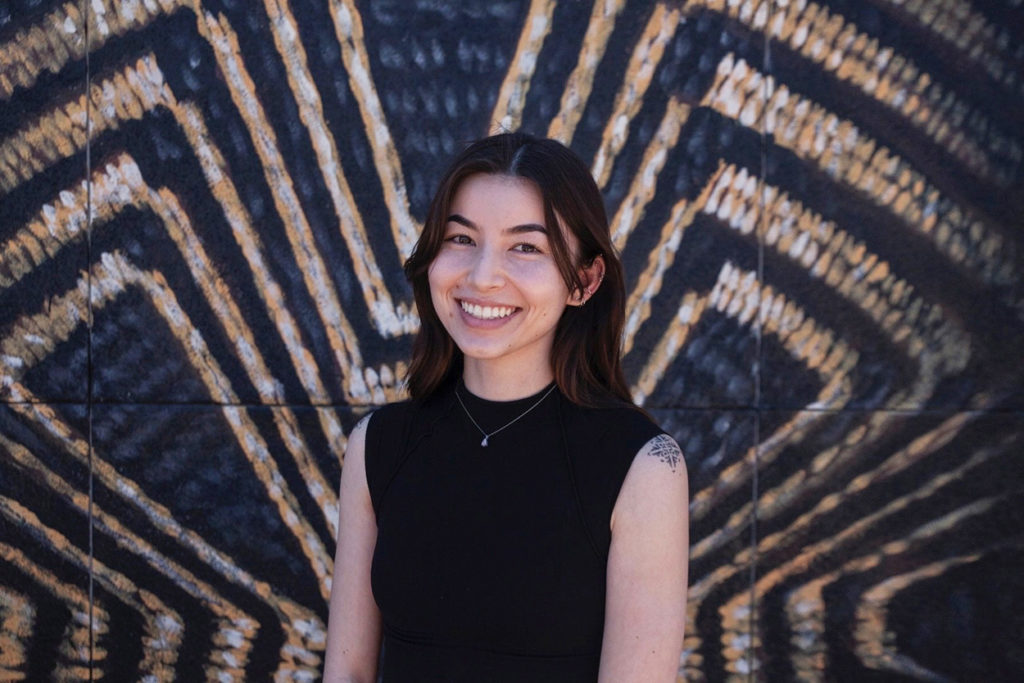Calista Olander traded one canvas — the ballet floor — for another in Art History when she enrolled in the University of Arizona School of Art.
But her love for learning and performing arts didn’t stop there, as she minored in Japanese and mathematics, learned two other languages, helped curate multiple student exhibitions, interned at MOCA Tucson … and studied the history of Korean and Italian cinema.
That explains why Professor Irene Bald Romano calls Olander a “modern-day Renaissance woman” — and why Olander has been named the spring 2023 Outstanding Senior in the School of Art for the College of Fine Arts.
Olander, who carries a 4.0 grade-point average, has been accepted into Columbia University’s Art History and Archaeology master’s program in New York.
“I’m very excited for grad school,” she said. “I’ll be studying European art between 1700-1900 and working with Professor Anne Higonnet, whose extensive study of Berthe Morisot will aid in my research of Morisot’s contemporary, Mary Cassatt.”

Olander’s first love was dance. She joined the Arizona Ballet Theatre when she was 8 and began teaching ballet, tap and jazz to children and teens when she was 16.
“I absolutely loved teaching and choreographing,” Olander said. “I unfortunately had to stop because of the pandemic, but the experience helped me in my college career … and in my research at the U of A.”
Olander became interested in Art History at Tucson’s University High, where she was a National Merit Scholar. Her Art History teacher’s “passion for the subject made me absolutely love it,” Olander said. “I learned how collections came to be and how museums can improve their exhibition practices to better represent the communities they serve.”
As a University of Arizona student, she continued her research on museums, which culminated in her Honors College thesis about “Decolonize This Place,” a newly formed collective dedicated to challenging issues found within art institutions that affect marginalized communities.
Her adviser, Dr. Sandra Barr, said Olander has “proven herself to have integrity, intelligence, humor and resilience” – in class and in her research on the “Decolonize” group.
“Decolonize This Place is trying to garner attention and protection for Native American art and grave goods,” Barr said. “Calista wrote a very thoughtful account of what the group is and what their aims are.”
Barr, Romano and Gallery Director lydia see nominated Olander for the outstanding senior award.
“Calista is a rare talent of a serious young scholar of art history and mathematics, with outstanding foreign language skills, and a love of the performing arts,” Romano said. “She is a modern day ‘Renaissance woman’ and justly deserving” of the award.
Olander can speak Japanese, Korean and French, and impressed the Art History faculty with “her thoughtfulness, thoroughness and excellence in every aspect of her work: writing, speaking and mentoring other students,” the nominating letter said.
Under see, Olander co-curated the “Donors & Scholars” exhibition in February and served as student gallery manager for the school’s Joseph Gross Gallery, assisting with four exhibitions.
“Calista has been a pleasure to work with and I have enjoyed co-creating exhibitions with her as she expands her curatorial practice,” see said. “She throws herself headfirst into experiential learning opportunities and … has already developed a skilled eye for exhibition design and a keen understanding of how the often-unseen tasks of preparatory and registration work contribute to this overall process.
“She has a bright career ahead, and I’m grateful I was able to work alongside her for a year.”
Olander volunteered at the Museum of Contemporary Art (MOCA) last year and interned there this spring.
In spring 2022, she also studied abroad in Seoul, South Korea, taking an intensive language course and a History of Korean Cinema class, which Olander said “connected well” with two courses she took on campus: Art History of the Cinema, with Anthropology Regents Professor David Soren, and an elective class in Italian cinema.
“It was really interesting to compare film made in Korea, Italy and the U.S., and helped me to appreciate this different art form,” Olander said.
During her final two semesters, she flourished under the guidance of Barr, Romano and see.
“Each of these three people helped me grow, both academically and personally,” Olander said. “They helped me find my path forward and I would not be where I am without them.”
